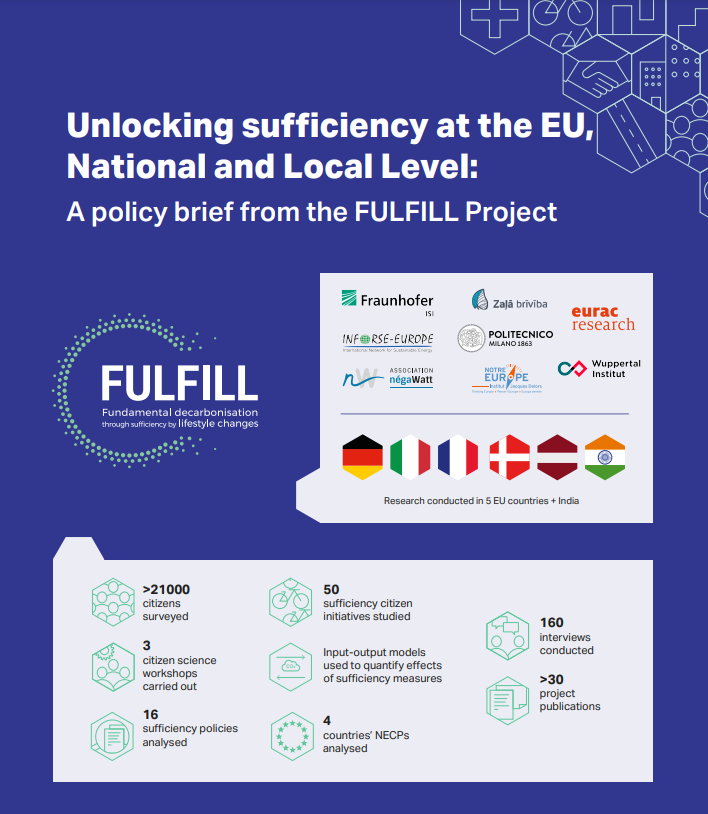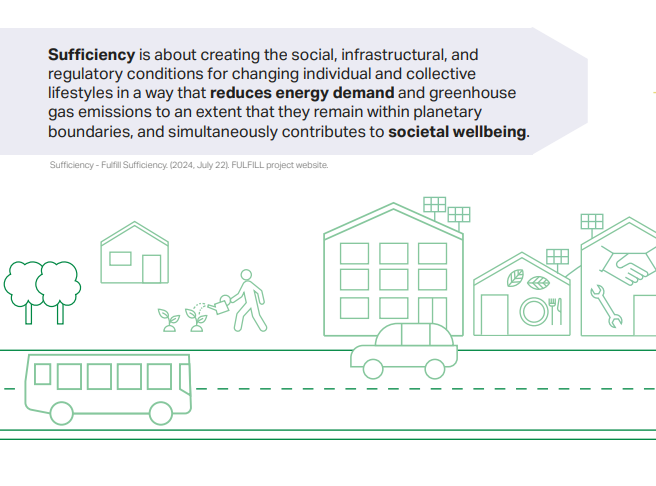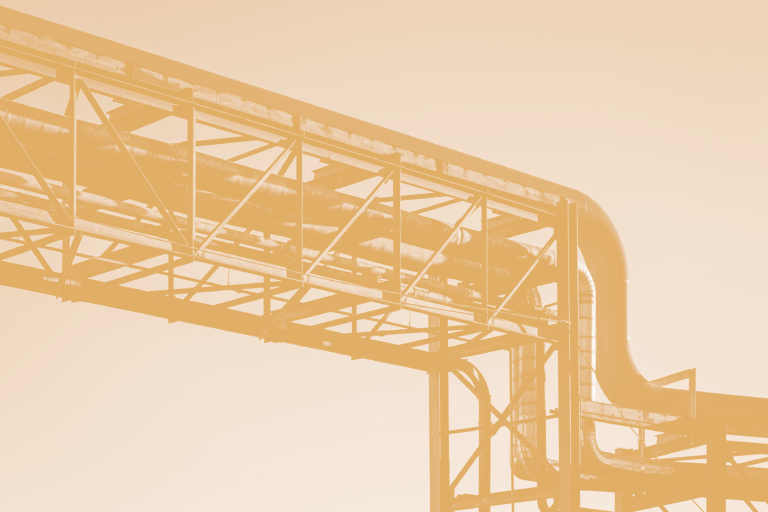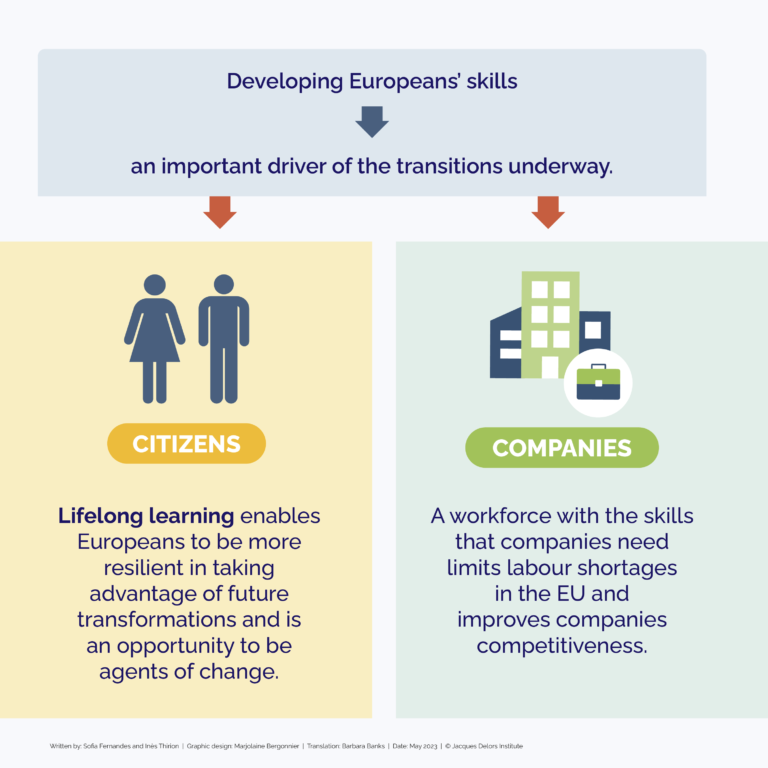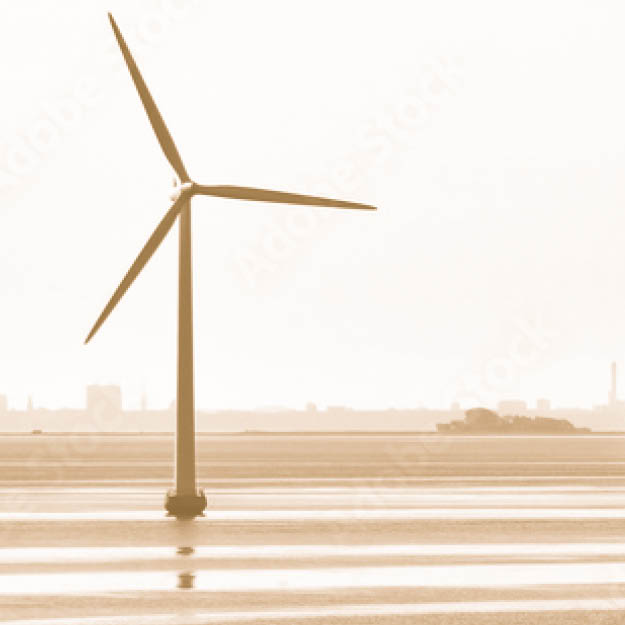Policy paper
Unlocking sufficiency at the EU, National and Local Level
A policy brief from the FULFILL Project
By Fiona Breucker and Edouard Toulouse
Sufficiency promotes a holistic approach to achieving low-carbon, high-wellbeing lifestyles through implementing supportive infrastructures, regulation and policies. It has the potential to offer numerous economic, social, health, and environmental benefits, making the EU’s climate goals more attainable and cost-effective while reducing dependency on fossil fuel imports and resource shortages. By avoiding unnecessary infrastructure investments and lowering energy system costs, sufficiency can create healthier diets, active lifestyles, reduced pollution, attractive urban spaces, improved well-being, reduced loneliness, and stronger community bonds.
This policy brief outlines key recommendations from the FULFILL project, a three-year, EU-funded Horizon 2020 research project to foster sufficiency at EU, national, and local levels.
SUR LE MÊME THÈME
ON THE SAME THEME
PUBLICATIONS
Building decarbonization and affordable housing: promoting local skills and accelerating the green deal

Sufficiency: Wellbeing for all within planetary boundaries

Fundamental decarbonisation through sufficiency by lifestyle changes

The sufficiency manifesto

Report on citizen engagement activities

Report on vertical and horizontal multilevel governance: 5 case studies

Report on the comparative analysis of sufficiency policies

Gas supply security in Europe

2023 European Year of Skills

The Swedish energy transition.
A race far from won

Regional perspectives on energy citizenship and citizen participation in the energy transition

Energy Sufficiency

European Dependence on Russian Gas –The Example of Nord Stream 2

Climate policy
of the new German Government

The German Energy transition

High energy prices. Russia fights back?

Cop 26: Europe leads the way towards climate neutrality

The European energy price spike

Building a clean mobility system in times of COVID-19

European Recovery Plan: Time for Green and Social Bonds!

Greener after

L’Europe sans charbon

Overcoming covid-19 crises
by building a clean and resilient Europe

Cities in Europe
What EU innovation can do for climate neutrality

A small electric car is 3 times cleaner than a small gasoline car

Climate Change: at the Heart of a New European Political Balance

Making the European energy transition socially sustainable

Electric vehicles, european mobility and industrial leadership at stake

Clean Mobility: The European Way – A Comprehensive Approach to Electric Vehicles in the Energy Transition

A French-German Cooperation Agenda for the Energy Transition in Europe

Reinforcing the EU Budget with a fossil-fuel contribution

Electric Cars: a Driver of Europe’s Energy Transition

Putting the consumer at the centre of the European energy system

Investment in Europe: Making the best of the Juncker Plan
COP21: an opportunity to speed up the global energy transition

2015 Climate negotiations: Speeding up or slowing down the energy transition?

The Energy Union: prospects, goals and challenges

Energy policy: European challenges, Spanish answers

What new Climate and Energy Package for the EU?

Think Global – Act European IV. Thinking Strategically about the EU’s External Action

Think Global – Act European IV – Thinking Strategically about the EU’s External Action

Saving emissions trading from irrelevance

Meeting Europe’s resource challenge within and beyond EU borders

The role of gas in the external dimension of the EU energy transition

Promoting low-carbon energies in the Mediterranean Partner Countries

EU resource management: time for coherence

Energy Transition by 2050: A Multifaceted Challenge for Europe

Joint responses to energy challenges through a European Energy Community

European solidarity : where do we stand? Should we foster it and how?

An External Energy Strategy for the EU

Nuclear energy in Europe: what future?

Towards a European Energy Community

Contribution to the European Commission Consultation: European Energy Strategy 2010/2020

Towards a European Energy Community: A Policy Proposal

Background Paper : Energy Trends in Europe

An ever less carbonated Union ? Towards a better European taxation against climate change

Collective Power: Enhanced Cooperation as the Driver of a Common Tradable Green Certificate Market

Sense and Flexibility: the Implementation of the EU ETS










